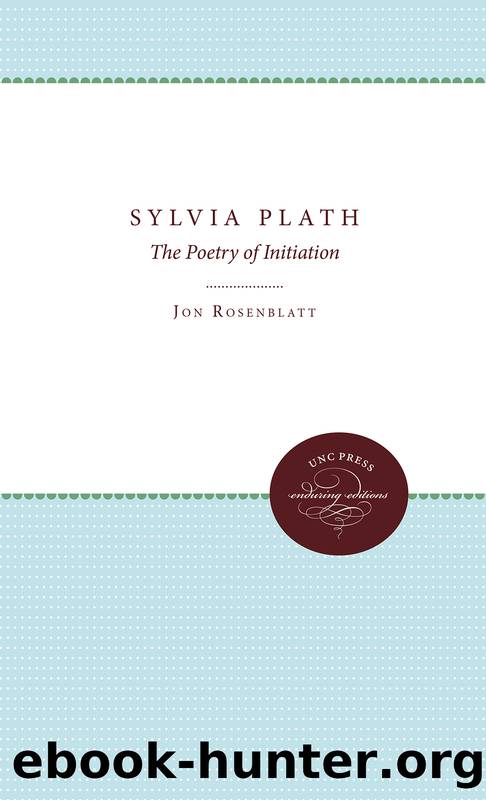Sylvia Plath by Jon Rosenblatt

Author:Jon Rosenblatt
Language: eng
Format: epub
Publisher: The University of North Carolina Press
Published: 2018-02-15T00:00:00+00:00
A last hook brings me
To the hillsâ northern face, and the face is orange rock
That looks out on nothing, nothing but a great space
Of white and pewter lights, and a din like silversmiths
Beating and beating at an intractable metal.
[CW, p. 13]
The sea is obviously a disappointment: it is ânothing,â a play of light and sound. Although the metaphor of silversmithing as applied to the waves beating on the shore might have been a vehicle for Romantic doctrine on creative nature, in Plathâs hands it becomes an expression of natureâs randomness and meaninglessness. Where she expects a transforming spirit, she finds only an absence. The sea becomes an âintractable metalâ that will not take on a humanly meaningful shape. Unlike the blackberries, which Plath converted into âsisters,â the sea resists all comforting anthropomorphic interpretation.
Two significant differences separate âBlackberryingâ from the poems of The Colossus. First, the metaphors of the poem are linked more through associative than logical processes. In the earlier poems, Plath tended to fix on a single metaphor, as in âThe Colossusâ or âHardcastle Crags,â and develop it through a progression of logical stages. But in the transitional landscapes she begins to free herself from the concept of the single metaphor or conceit as the framework for the poem. She now sees metaphors as temporary indicators of a mental state: they must inevitably give way to new stages in the mental process. The landscape thus appears as a mental construction of the poet rather than as an objectively perceived external scene. The metaphors and similes of âBlackberryingâ correspond more closely to the momentary perceptions of the speaker than do the metaphors of The Colossus poems: blackberries as hooks, birds as bits of paper, the waves as silversmiths.
Second, the mood in âBlackberryingâ is less confident and buoyant than in The Colossus. The abandonment of traditional stanza forms and rhyme schemes as well as Plathâs willingness to associate images more freely appears to have allowed her to open up disturbing personal material. The Colossus includes mainly poems of natural menace and danger, yet it gives the impressionâprincipally because of its formal regularity and literary dictionâof the poetâs control over the hostile external forces. This control becomes increasingly less apparent in the poems after 1959. Plath permits herself the expression of irrational elements that cannot be confined within symmetrical structures. In Ariel and Winter Trees, the sense of being overwhelmed and victimized by an irrational world has taken over, and the poem no longer presents a structure that creates distance from the disorder of the universe. Form comes to reflect the speakerâs violent war with the world and with others.
Although the transitional landscapes are more open to the personal situation of the poet than are the earlier landscapes and seascapes, they fail to make the natural scene they describe meaningful in relation to a specific personality. Thus it is often difficult to know how to respond to certain natural images or what particular issue the images focus on. Still, these transitional poems have extraordinary individual lines and images and, almost always, a coherent tone.
Download
This site does not store any files on its server. We only index and link to content provided by other sites. Please contact the content providers to delete copyright contents if any and email us, we'll remove relevant links or contents immediately.
4 3 2 1: A Novel by Paul Auster(12354)
The handmaid's tale by Margaret Atwood(7729)
Giovanni's Room by James Baldwin(7301)
Asking the Right Questions: A Guide to Critical Thinking by M. Neil Browne & Stuart M. Keeley(5741)
Big Magic: Creative Living Beyond Fear by Elizabeth Gilbert(5726)
Ego Is the Enemy by Ryan Holiday(5392)
The Body: A Guide for Occupants by Bill Bryson(5065)
On Writing A Memoir of the Craft by Stephen King(4920)
Ken Follett - World without end by Ken Follett(4706)
Adulting by Kelly Williams Brown(4552)
Bluets by Maggie Nelson(4534)
Eat That Frog! by Brian Tracy(4500)
Guilty Pleasures by Laurell K Hamilton(4425)
The Poetry of Pablo Neruda by Pablo Neruda(4079)
Alive: The Story of the Andes Survivors by Piers Paul Read(4010)
White Noise - A Novel by Don DeLillo(3990)
Fingerprints of the Gods by Graham Hancock(3979)
The Book of Joy by Dalai Lama(3961)
The Bookshop by Penelope Fitzgerald(3827)
